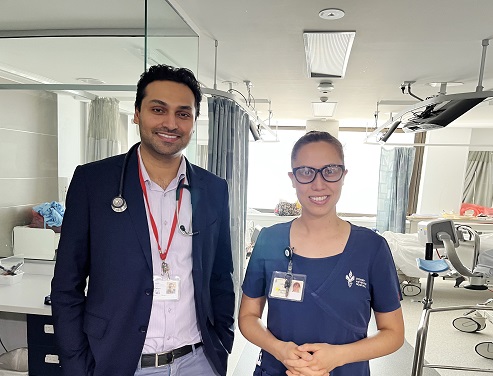A $20,000 grant, made possible through donations to the San Foundation, means that a long-held dream for the San to have a dedicated space for diversional therapy and guided activities for patients with dementia will become a reality. The grant also enables research into how this will impact patient outcomes.
An area which used to be a four-bed ward on Level 7 Burnside will be converted into a special unit for diversional therapy such as arts and crafts, music therapy, pet therapy, an indoor garden, structured programs, and reminiscence activities.
“Patients with dementia are more prone to worsening behavioral symptoms and agitated delirium when they come to hospital,” said Dr Ketan Bhatt, a physician in geriatrics and general medicine at Sydney Adventist Hospital. “This can lead to a host of problems, including falls, antipsychotic administration, exit-seeking behavior and stress on carers/nursing staff.”
“The aim of this new unit is to see if we can better cater to the psychosocial needs of our patients who have dementia and reduce adverse outcomes. Hospitals can be unsettling and disorienting environments for such patients and result in significant patient stress and problematic behavior.”
This initiative is a first for the San. It is also reportedly the first private hospital in NSW to conduct research into a dedicated dementia space of this kind.
The new space
Patients will have their own rooms as normal, but during the day they’ll have the option of spending time in the new activity centre located on the same ward.
“People with dementia need to connect socially with other people and to do varied and interesting activities, but often they need someone to guide them through it,” said Marleta Fong, Cognitive Impairment Nurse and Clinical Nurse Consultant at the San. “The psychosocial needs of a person with dementia are harder to meet than for those who do not have dementia. This room will facilitate interaction and connection, and the activities will help reduce anxiety, provide stimulation and promote confidence.”
Dr Bhatt expects this new model of care will help lessen patient’s distress and agitation, improve comfort and dignity, decrease the number of falls and reduce the need for psychotropic drugs. It may also shorten the length of stay hospital and ease some of the stress on nursing staff.
The research project
Part of the $20,000 grant from the San Foundation will be used to fund research into this new model of care for people with dementia in the acute hospital setting. The chief investigators of this research project are Dr Bhatt and Marleta Fong.
“We call this research a ‘before and after’ study,” said Dr Bhatt. “We will look back at the medical records of a random cohort of 100 patients with dementia and compare them prospectively to 100 patients who have used the new activity centre during their hospital stay. The aim is to see if there is quantifiable data to show this intervention has an impact.” The research project will also include information from hospital staff and patients’ families.
“We are very appreciative to all the donors who have made it possible to start work on the new activity centre and the associated research project,” said Dr Bhatt. “This grant is a great start and we’re excited to see this initiative get underway. We think this model of care will transform the care of patients with dementia throughout their hospital stay.”
The new activity centre will be completed by the end of this year, and it is expected the research project will take two years.
